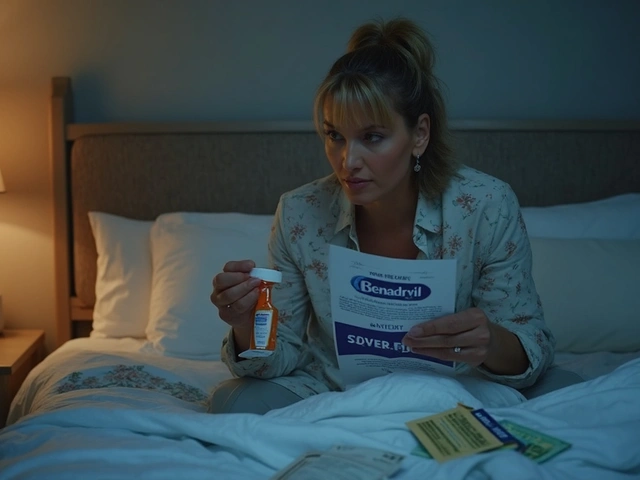Why People Turn to Benadryl for Anxiety
When anxiety spins up and your thoughts start racing, the medicine cabinet almost calls your name. Benadryl, known mostly for allergies, is a popular go-to. What surprises a lot of people is that diphenhydramine—the ingredient hiding behind the Benadryl brand—has sedative effects. That knock-out drowsiness is why some folks try it when nerves are fried, or sleep feels impossible.
It’s not hard to see why Benadryl for anxiety has caught on. It’s easy to grab, no doctor needed, and it’s cheap. Plus, who doesn’t have a story of a sleepless night turned around by that classic pink pill? But here’s the catch: Benadryl wasn’t made for anxiety. It never passed the scientific sniff test for helping restless minds. In fact, the FDA stamped it for allergies, not for a shaky heart or a busy brain.
People often start using Benadryl for anxiety because prescription meds seem scary, or because there’s shame in needing help. Sometimes, there’s a genuine fear of addiction. Stories travel—someone you trust mentions it worked for them, and next thing you know it’s in your medicine drawer. Others try it for lack of better options or because they don’t want to mess with stronger stuff like benzodiazepines.
For parents who can’t risk groggy mornings (hello, kids’ school drop-offs), or folks who live alone and need to be alert, the drowsy hangover from Benadryl can mess up everything. The sedative punch is felt differently by everyone, but if you’re chasing anxiety relief, being knocked out isn’t always the answer. It solves one problem (the racing thoughts) but hands you a new one—slow reaction times, fuzzy thinking, even riskier driving the next day. Your brain isn’t so good at multitasking under a drowsy haze.
There’s also this trust in older meds; Benadryl’s been around since the 1940s, and older relatives tend to trust it. But back then, understanding of anxiety was pretty limited. People talked about being “nervous,” not “anxious,” and side effects weren’t discussed the way they are now.
Diphenhydramine reaches most people’s homes as either Benadryl, or as “PM” labeled sleeping aids in those bold blue boxes. If you’re not paying attention, it’s in all sorts of stuff—cough syrup, itch meds, you name it. It gets sold side by side with supplements and home remedies because it’s considered “safe” in small, one-time doses. The big problem comes when that occasional dose turns into several nights a week, then most nights. Suddenly, your body and your sleep both depend on it.
Anxiety comes in waves, and it’s totally normal to want fast relief. But with Benadryl, there’s definitely more story under the hood. A lot of people have no idea about the real baggage that comes with repeated use. Before reaching for that familiar pink pill for your next round of nerves, it’s worth stopping to ask yourself what’s really going on with your brain and body.
Hidden Dangers of Diphenhydramine Use
Here’s something most people never learn from a Benadryl commercial: diphenhydramine isn’t just a “safe” little helper for sleep or allergies. The risks, especially for anxiety self-treatment, can sneak up on you. Let’s start with brain fog. That slow, muddled feeling the morning after isn’t just the price of sleep—it’s a sign your brain’s processing power took a hit. For students, parents, or anyone who drives or operates machinery, that drowsiness can be outright dangerous.
There’s a bigger deal hiding in long-term use. Experts in neurology have found links between regular diphenhydramine use and brain health problems later in life. A study out of the University of Washington tracked older adults over several years and showed a higher risk for dementia among those frequently using “anticholinergic” drugs—Benadryl included. These meds block a specific brain chemical (acetylcholine) that helps with memory and learning. Cut it off too often, and you could be trading tonight’s anxiety relief for memory problems in your 60s or 70s.
Kids and older adults are especially sensitive to these risks. Children can react with hyperactivity, trouble focusing, or even confusion. Seniors can get dizzy, fall, or end up in the ER from a simple pill they thought was harmless. Several hospitals have posted alerts about this in the last couple years, especially with the spike in self-medication after the pandemic.
Let’s talk about mixing diphenhydramine with other stuff. It plays badly with many prescription meds—especially antidepressants (like SSRIs and SNRIs) and other sedatives. Combine the wrong pair, and you can wind up with serotonin syndrome, a medical emergency that’s no joke. The more hidden risk? Even over-the-counter cold or allergy meds sometimes double up on diphenhydramine, so people accidentally take double-doses.
Ever have your heart race after taking Benadryl? That’s no coincidence. Diphenhydramine can mess with your heart rhythm. People with existing heart conditions or high blood pressure should be extra careful. According to the FDA, diphenhydramine can sometimes cause arrhythmias (irregular heartbeat), especially if combined with alcohol or other sedatives.
People who try Benadryl for anxiety sometimes end up with a weird loop—using it for stress, feeling poorly rested from the drowsiness, and then getting more anxious because their body doesn’t feel normal. It’s the classic “solution creates a new problem” scenario.
Another little-known fact: diphenhydramine can cause urinary retention, especially in men with prostate issues. That means trouble peeing and a lot of discomfort by morning. On top of that, dry mouth, constipation, and blurred vision are all on the list, even for young, healthy people.
If you have a pet at home, like our big rescue dog Bruno, be aware: accidental ingestion can be life-threatening for animals. Dogs and cats process meds differently, and Benadryl can push them into seizures or comas fast.
So while Benadryl feels like a mild choice, the safety net is actually thinner than you think. It isn’t a villain, but it’s not a friend you should lean on for anxiety, especially not in the long run.

Better Over-the-Counter Approaches for Anxiety
If Benadryl isn’t a smart bet, what actually helps when your anxiety flares up? There’s no magic pill on Walgreens’ shelf, but a few alternatives can make those tough moments easier without packing hidden punches.
First, let’s look at antihistamines that sometimes get used off-label for anxiety. Hydroxyzine is a bigger player here—a prescription drug that works faster for acute anxiety, with fewer memory risks than diphenhydramine. But it’s not over-the-counter. Some people start with one and switch to the other, mainly out of desperation or bad advice. Hydroxyzine’s cousin meds, like cetirizine (Zyrtec) or loratadine (Claritin), don’t work for anxiety. They just aren’t sedating enough.
Non-prescription options have a different story though. Some people try supplements marketed for “calm” or sleep, mostly made up of herbs. Here’s a look at the usual suspects:
- Melatonin: Best for sleep, not for calming nerves during the day. Safe if used short-term and at low doses, but can disrupt your natural hormone rhythms if overused.
- Valerian Root: Used for centuries in Europe. Several small studies say it helps with mild anxiety, though results aren’t bulletproof. Some people complain about weird dreams or grogginess.
- L-theanine: Found in green tea, it’s loved for a gentle, subtle calm without sleepiness. I’ve tried it on a workday and didn’t feel knocked out—just a little less jittery.
- Magnesium: Known for muscle relaxation, and low levels have been tied to higher anxiety. If you’re deficient, a supplement can help.
- CBD (Cannabidiol): Gaining popularity for stress, though legal status and purity vary by state. Small studies show it can take the edge off, but don’t expect miracles—and check with your doc if you’re on other meds.
Some herbal remedies, like kava or passionflower, pop up in “stress” teas. Kava works, but can cause liver problems with regular use. If you’re pregnant, breastfeeding, or take prescription meds, double-check for interactions.
Simple self-care tricks also give quick relief. Breathing exercises, going outside for a walk with your dog (like I do with Bruno in Forest Park), listening to music, and guided apps for mindfulness can work wonders when used regularly.
If you’re looking for a one-stop overview of medicine like Benadryl for anxiety, this resource dives into the facts—what works, what doesn’t, and what’s actually safe for occasional relief.
The most important thing is to use any “calm” aid, whether pill or tea, for the short-term only. If you find yourself needing something daily, it’s time to talk with a medical pro. Anxiety can be a short storm, but if it’s turning into a constant cloud, over-the-counter fixes are just band-aids. Better to fix what’s underneath than keep patching things up until you can’t function.
When to See a Doctor and Tips for Managing Safe Relief
Anxiety isn’t just a “bad habit” or something you can always willpower away. If it keeps popping up, don’t settle for quick fixes from the drugstore shelf. Here’s the tough truth: If you’ve tried Benadryl or other OTC meds for more than a few nights a month, or if your anxiety keeps getting in the way of work, parenting, or basic fun, it’s time for a check-in with your healthcare provider.
Doctors can tailor solutions you might never consider on your own—like cognitive behavioral therapy, which has more research backing it than any pill on the planet. Some medications (at lower, monitored doses) have a way better track record at calming anxiety without risking your memory, mental sharpness, or future health.
It can help to keep a brief journal. Track your anxiety spikes—time of day, triggers, what you ate, how much sleep you got. Sometimes changing a simple thing—less caffeine in the afternoon, short walks after dinner, keeping your bedroom cool—makes a huge difference. I started using a weighted blanket for Arista (my daughter) when she was having school stress, and honestly, I ended up stealing it for myself half the time.
Don’t ignore your body. If you notice muscle twitching, heart flutters, or major changes in sleep or appetite with extra anxiety, get those checked out. Sometimes what feels like anxiety can have a physical root, like thyroid problems or anemia.
Set boundaries with family and friends, too. Anxiety loves company, and being around folks who are always on edge can boost your own stress. Make a “calm-down” plan—like texting a friend, heading outside, or doing a five-minute meditation on your phone. Make it as normal as brushing your teeth.
Remember, using Benadryl for anxiety once isn’t a disaster, but regular use is a wake-up call to look deeper. There are safer choices, and you deserve better than bandaid solutions or brain fog mornings. If you’re parenting, teaching, or just trying to get through a tough patch, check with healthcare pros before making OTC meds your crutch. Your future self, your pets, and the people who count on you will thank you for playing it safe and smart.


